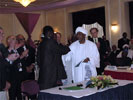
His country’s unimaginable crisis is not stopping Zimbabwean President Robert Mugabe from hosting a birthday party that will make Steve Schwarzman’s 60th birthday celebration look like a backyard barbeque. On the menu for Mugabe’s fete: “2,000 bottles of champagne (Moët & Chandon or ’61 Bollinger preferred); 8,000 lobsters; 100kg of prawns; 4,000 portions of caviar; 8,000 boxes of Ferrero Rocher chocolates; (and) 3,000 ducks.” Such luxury is par for the course for a man who two years ago celebrated his 84th with 20,000 cronies in a Gweru soccer stadium.

